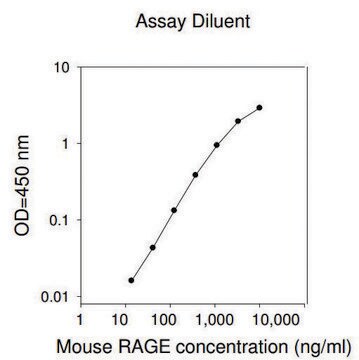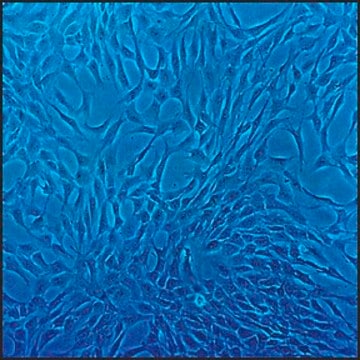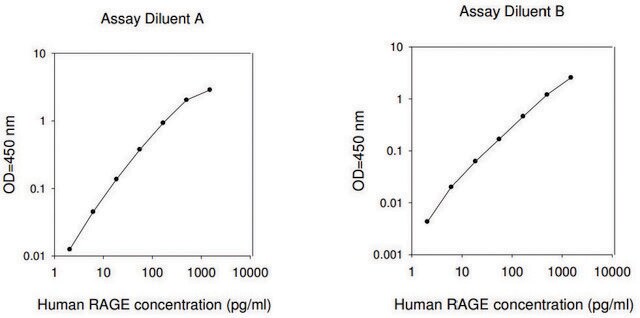RAB0009
Rat RAGE / AGER ELISA Kit
for serum, plasma and cell culture supernatant
Iniciar sesiónpara Ver la Fijación de precios por contrato y de la organización
About This Item
UNSPSC Code:
41116158
NACRES:
NA.32
Productos recomendados
species reactivity
rat
packaging
kit of 96 wells (12 strips x 8 wells)
technique(s)
ELISA: suitable
capture ELISA: suitable
input
sample type cell culture supernatant(s)
sample type serum
sample type plasma
assay range
inter-assay cv: <12%
intra-assay cv: <10%
sensitivity: 300 pg/mL
standard curve range: 0.41-300 ng/mL
detection method
colorimetric
shipped in
wet ice
storage temp.
−20°C
Gene Information
rat ... Ager(81722)
General description
The Rat RAGE (Receptor for Advanced Glycation End Products) ELISA (Enzyme-Linked Immunosorbent Assay) kit is an in vitro enzyme-linked immunosorbent assay for the quantitative measurement of Rat RAGE in serum, plasma, cell culture supernatants and urine.
Immunogen
Recombinant Rat RAGE
Application
For research use only. Not for use in diagnostic procedures.
Please refer to the attached General ELISA KIT Procedure (sandwich, competitive & Indirect ELISA)
Please refer to the attached General ELISA KIT Procedure (sandwich, competitive & Indirect ELISA)
Other Notes
A sample Certificate of Analysis is available for this product.
Please type the word sample in the text box provided for lot number.
Please type the word sample in the text box provided for lot number.
Los componentes del kit también están disponibles por separado
Referencia del producto
Descripción
SDS
signalword
Warning
hcodes
pcodes
Hazard Classifications
Met. Corr. 1
Storage Class
8A - Combustible corrosive hazardous materials
Elija entre una de las versiones más recientes:
¿Ya tiene este producto?
Encuentre la documentación para los productos que ha comprado recientemente en la Biblioteca de documentos.
Yin-Ching Chuang et al.
BMC pulmonary medicine, 14, 115-115 (2014-07-16)
Glutamine (GLN) has been reported to improve clinical and experimental sepsis outcomes. However, the mechanisms underlying the actions of GLN remain unclear, and may depend upon the route of GLN administration and the model of acute lung injury (ALI) used.
David G S Farmer et al.
Pulmonary pharmacology & therapeutics, 29(1), 7-14 (2014-01-15)
The calgranulin-like protein MTS1/S100A4 and the receptor for advanced glycation end-products (RAGE) have recently been implicated in mediating pulmonary arterial smooth muscle cell proliferation and vascular remodelling in experimental pulmonary arterial hypertension (PH). Here, the effects of RAGE antagonism upon
Zhi-hong Wang et al.
Molecular nutrition & food research, 58(7), 1426-1435 (2014-03-04)
Antiglycative effects of glycyrrhizic acid (GA) in kidney of diabetic mice were examined. GA at 0.05, 0.1, and 0.2% was supplied to diabetic mice for 9 wk. Results showed that GA intake increased its deposit in kidney, raised plasma insulin
Yuuki Shimizu et al.
Journal of the American Heart Association, 9(4), e014691-e014691 (2020-02-19)
Background DJ-1 is a ubiquitously expressed protein typically associated with the development of early onset Parkinson disease. Recent data suggest that it also plays a role in the cellular response to stress. Here, we sought to determine the role DJ-1
Bianca de Moraes Fracasso et al.
PloS one, 14(1), e0209964-e0209964 (2019-01-12)
Circulating advanced glycation end products (AGE) and their receptor, RAGE, are increased after a myocardial infarction (MI) episode and seem to be associated with worse prognosis in patients. Despite the increasing importance of these molecules in the course of cardiac
Nuestro equipo de científicos tiene experiencia en todas las áreas de investigación: Ciencias de la vida, Ciencia de los materiales, Síntesis química, Cromatografía, Analítica y muchas otras.
Póngase en contacto con el Servicio técnico








